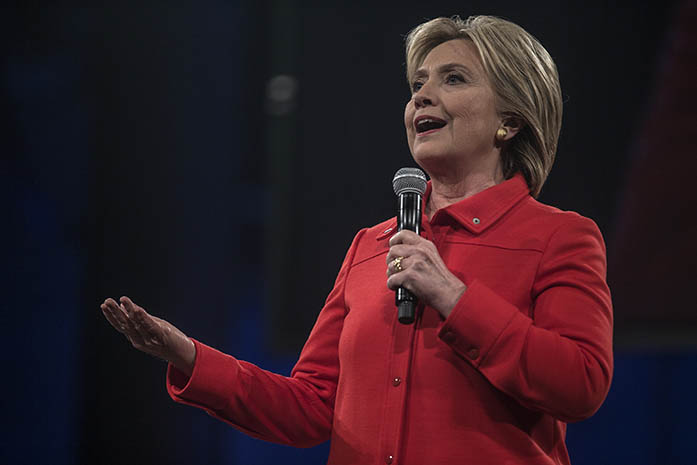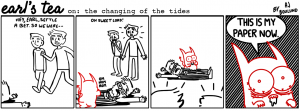Opinion: Conspiracy theories are hurtful to public discourse
Promoters of unsubstantiated myths practice a worldview that is cynical, distrusting of others, and ultimately detrimental to our democracy.
Former Secretary of State Hillary Clinton gives a speech during the Jefferson-Jackson Dinner on Saturday, Oct. 24, 2015. Each of the three Democratic presidential nominees held rallys before attending the Jefferson-Jackson Dinner. (The Daily Iowan/Sergio Flores)
October 27, 2019
In the online era of fake news, there are many conspiracy theories floating around in the public and among those in positions of authority. Conspiracy theories are toxic to our republic. They undermine trust in legitimate institutions and benign public officials.
One leader with a too-friendly relationship with such theories is former Secretary of State Hillary Clinton. In 1998, she vehemently dismissed credible allegations of sexual misconduct against her husband as part of a “vast right-wing conspiracy.” After losing the 2016 presidential election to a deeply unpopular and often repugnant man, she spent two years promoting silly theories that he nefariously colluded with the Russians to steal her thunder.
In keeping with her McCarthyite theme, last week Clinton floated a thinly veiled slander against Rep. Tulsi Gabbard, D-Hawaii, claiming that the GOP was secretly grooming her to undermine the Democrats and run a third-party campaign. Clinton may have been suggesting the Russians were behind this, as it’s not entirely clear who she believes the secret puppet-masters are. Gabbard seems to relish the ordeal, which has given her fringe campaign a much-needed fundraising boost.
Obviously, Clinton is not the only person in politics selling snake oil. At the extreme end, there’s Alex Jones of InfoWars, who has never met a conspiracy theory he doesn’t like. Jones has claimed absurd fantasies such as government efforts to turn citizens gay with chemicals in public-water supplies, turning “the freakin’ frogs gay.”
In the mainstream, star Fox News pundit Sean Hannity spent several weeks in 2017 promulgating loony ideas about Democratic National Committee staffer Seth Rich’s murder, against the wishes of Rich’s devastated family.
President Trump himself retweeted unsubstantiated lies about financier Jeffrey Epstein’s death. In fairness, Epstein’s death happened under unclear circumstances but it was still inappropriate to forward such unsubstantiated notions, especially for a man in Trump’s position.
Conspiracy theories are an intellectually lazy and a cynical way of escaping difficult arguments. If someone in power is a drug pusher (who doesn’t love a good Mean Girls reference), that relieves me of the obligation to provide thoughtful arguments when I criticize his policies. By the same token, if President Bush invaded Iraq to steal the oil, then I need not seriously debate the merits of American interventionism. There are countless valid arguments to be made on that topic, all of which require studying the issues in-depth.
These sort of deplorable yet transparent conspiracy-peddling tactics are not new, and have probably been used since before Gutenberg printed his first page. Alas, these hoaxes continue to dupe a substantial and gullible plurality of the population.
New Mexico State University researchers found conspiracy theories are akin to a gateway drug, as those who believe one are more likely to believe others. The true believers hastily attribute to diabolical malice what is almost always instead caused by incompetent actors or sheer chance. Authority figures should explain to young people why a conspiratorial worldview is erroneous, as young minds are especially susceptible to such fallacious thinking.
As someone who has complained about conspiracy theories and has been the subject of them for decades, one would think Clinton would have enough self-awareness to refrain from such baseless accusations herself. Those who desire to be taken seriously should exercise prudence when making claims. Don’t be the lunatic who cried gay frog.
Columns reflect the opinions of the authors and are not necessarily those of the Editorial Board, The Daily Iowan, or other organizations in which the author may be involved.






